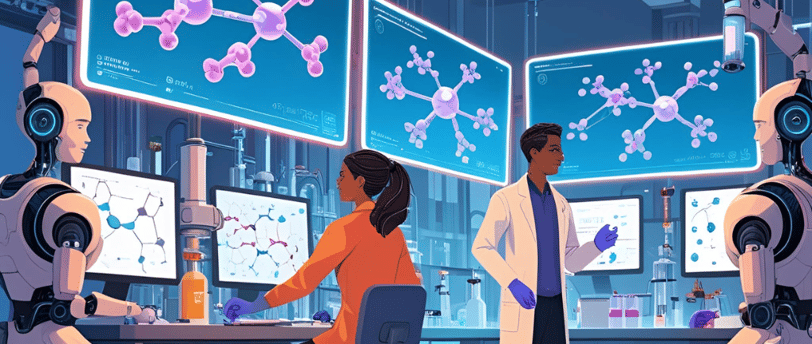How Is AI Being Used in Healthcare?
AI is no longer experimental. It’s showing up in real workflows, solving specific problems, and giving smaller clinics a path to operate more efficiently while improving care. This article explores how AI is being used across healthcare - and what that means specifically for specialty clinics.
6/2/20253 min read


Artificial intelligence has been transforming healthcare for years, but most of the headlines tend to focus on large hospitals or the pharmaceutical industry. These are important areas, and they’ve driven much of the early innovation. But today, the most practical and immediate gains are happening in a different space: specialty clinics.
What We Mean by AI in Healthcare
Before diving in, it’s worth clarifying what “AI” actually means in a healthcare context.
At its core, artificial intelligence refers to computer systems that can mimic or assist human decision-making. This includes machine learning (systems that learn from data), natural language processing (understanding and generating human language), and computer vision (analyzing images and video). These technologies are being applied in hundreds of ways across the healthcare system.
For specialty clinics, AI doesn’t mean replacing doctors or going fully digital. It means applying targeted tools that help streamline operations, reduce manual work, and support better decisions.
Where Hospitals and Pharma Lead
Hospitals and pharmaceutical companies have been early adopters, largely because they have the data volume, budgets, and infrastructure to support AI integration.
Examples include:
Diagnostic imaging: AI tools help radiologists detect tumors, fractures, or abnormalities in scans faster and more accurately.
Clinical decision support: Systems like IBM’s Watson were designed to assist doctors in making complex treatment decisions.
Drug development: AI is accelerating how drugs are discovered and tested by analyzing huge sets of biological and chemical data. Our friends at Sobek are exploring this area currently.
These applications are important benchmarks. They show what’s possible - and they set the stage for how AI can be applied in more focused, clinic-level environments.
The Shift to Specialty Clinics: AI Moves Closer to the Front Lines
Specialty clinics operate under different pressures than large hospitals. They often have smaller teams, tighter margins, and more direct relationships with patients. That creates both a need and an opportunity for AI adoption.
Rising labor costs, staffing shortages, and patient expectations are pushing clinics to find smarter ways to work. AI is filling the gaps - not by doing everything, but by doing a few critical things faster, more accurately, and with less friction.
Real-World Use Cases in Specialty Clinics
AI is being used in specialty clinics today in several practical, high-impact ways:
Patient Intake and Triage
AI chatbots and symptom-checking tools guide patients through intake before they arrive. This reduces front desk workloads and improves the accuracy of initial assessments.
Scheduling and Administrative Workflows
Patient self-scheduling tools help reduce no-shows and fill last-minute appointments. Other systems automate routine paperwork, data entry, and billing tasks.
Diagnostics and Decision Support
AI supports clinicians with early detection and second-opinion insights in areas like dermatology, ophthalmology, and cardiology. These tools assist, not replace, provider judgment.
Personalized Treatment Planning
Some systems use historical outcome data to suggest care pathways or flag patients at risk for complications. This supports more proactive and tailored care.
Documentation and EHR Automation
Natural language tools generate SOAP notes or assist with charting during and after visits. This cuts documentation time and reduces burnout.
Patient Communication and Follow-up
AI assists with appointment reminders, post-visit instructions, and captures PROMs. This improves follow-through and patient satisfaction.
Challenges and Considerations
No AI tool is plug-and-play. Clinics need to think carefully about:
Data privacy: HIPAA compliance is non-negotiable. Any AI vendor must be able to meet security and regulatory requirements.
Workflow integration: Tools that don’t fit existing systems create more problems than they solve.
Staff adoption: Without proper training and buy-in, even the best tools go unused.
Measuring ROI: Clinics should establish clear goals for what success looks like, whether it's time saved, revenue recovered, or patient outcomes improved.
What This Means for the Future of Specialty Clinics
AI gives specialty clinics a chance to level up. Not by becoming tech companies, but by using smart tools to deliver better care with fewer resources.
Early adopters will have a real advantage. They’ll retain staff more easily, improve patient experience, and position themselves to grow or differentiate in increasingly competitive markets.
The key is thoughtful, tailored implementation. One-size-fits-all solutions rarely work at the clinic level. That’s where strategy matters.
Take the Next Step
If you're considering how AI might fit into your clinic’s workflow, we can help. Stratavos Group specializes in helping specialty clinics identify practical, cost-effective ways to implement AI and automation. We can also build custom AI automation and virtual assistant solutions to increase staff efficiency and boost profitability.
Contact us to schedule a strategy call and explore how AI could work for your clinic - on your terms, with your priorities.
Stratavos Group
HIPAA-certified experts in AI, digital marketing, and healthcare consulting
CONTACT US
NEWSLETTER
© 2025. All rights reserved.
